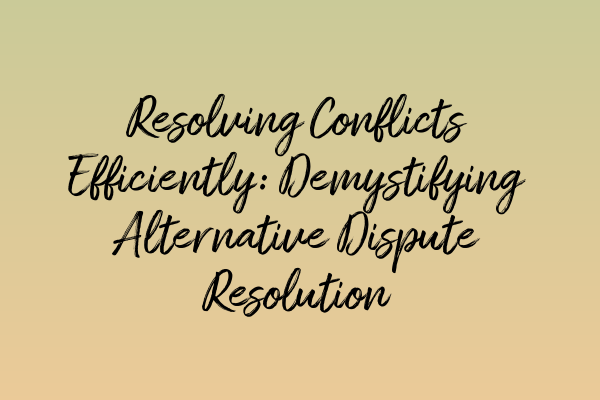Resolving Conflicts Efficiently: Demystifying Alternative Dispute Resolution
In today’s fast-paced and competitive legal landscape, finding efficient and effective ways to resolve conflicts has become more important than ever. Traditional litigation can be time-consuming, costly, and emotionally draining for all parties involved. Enter alternative dispute resolution (ADR), a set of methods aimed at resolving disputes outside of the courtroom, with increased efficiency and a focus on reaching mutually agreeable solutions.
ADR encompasses various techniques, including negotiation, mediation, and arbitration, each with its own unique advantages and considerations. In this article, we will demystify ADR, explore its benefits, and discuss how it can provide a better alternative to traditional litigation.
An Overview of Alternative Dispute Resolution
Alternative dispute resolution refers to a range of processes that offer parties in a conflict an opportunity to resolve their disputes without resorting to court proceedings. These processes are voluntary, flexible, and confidential, allowing the parties involved to maintain control over the outcome and tailor a resolution that meets their specific needs.
1. Private Prosecutions: Exploring Non-Governmental Prosecutions in Criminal Cases
2. Rights of the Accused: Protecting Individual Liberties in Criminal Proceedings
3. Magistrates’ Court vs Crown Court: Understanding Key Differences
4. Protecting Vulnerable Witnesses in Criminal Trials: Best Practices and Legal Safeguards
5. Unraveling the Complexities of UK Bail Laws
Negotiation: Finding Common Ground
Negotiation is a fundamental aspect of the legal profession and a key tool in resolving conflicts. It involves parties engaging in discussions to reach a mutually acceptable agreement. Negotiation can occur directly between the parties, or their solicitors can represent their interests.
During the negotiation process, parties can openly communicate their interests, concerns, and desired outcomes. This open dialogue fosters understanding, promotes trust, and allows for creative solutions that go beyond the strict realm of legal rights and obligations.
However, negotiation requires effective communication skills, a willingness to compromise, and an understanding of legal principles and the potential consequences of not reaching an agreement. This is where seeking guidance from an experienced negotiator can be invaluable.
Mediation: Facilitating Resolution Through a Neutral Third Party
Mediation is a structured and facilitated process that involves a neutral third party, the mediator, assisting the parties in reaching a mutually acceptable resolution. The mediator does not make decisions but instead guides the parties through communication, exploration of options, and the negotiation of a settlement.
Mediation offers several benefits, including its non-adversarial nature, which promotes cooperation instead of confrontation. It allows the parties to maintain control over the outcome and fosters a more amicable and respectful relationship moving forward. Moreover, mediation is often quicker and more cost-effective than traditional litigation.
During the mediation process, the mediator encourages the parties to express their interests, concerns, and needs. Through active listening and effective communication techniques, the mediator helps the parties identify common ground and explore potential solutions that address their underlying interests.
If the parties reach an agreement, the mediator can assist in formalizing the terms into a legally binding document. However, if no agreement is reached, the parties can still pursue other means of resolution, such as arbitration or litigation.
Arbitration: An Alternative to Court Proceedings
Arbitration is a more formal process that involves submitting a dispute to one or more impartial individuals, the arbitrators, who make a binding decision. The arbitrators, often selected based on their expertise in the subject matter of the dispute, conduct a hearing where evidence is presented, witnesses may be called, and legal arguments are made.
Arbitration offers several benefits, including its flexibility, speed, and expertise-based decision-making. Parties can choose the number of arbitrators, the rules governing the process, and the location and language of the arbitration. This flexibility allows the parties to tailor the process to their specific needs and ensures a more efficient resolution.
Furthermore, arbitration proceedings are generally less formal than court proceedings, reducing the time and costs associated with complex litigation. The expertise of the arbitrators also ensures that the decision is based on specialized knowledge, potentially resulting in a more accurate and legally sound outcome.
Nevertheless, it is essential to note that the decision reached in arbitration is legally binding and enforceable, just like a court judgment. Thus, parties should carefully consider whether arbitration is the appropriate avenue for their dispute and seek expert advice.
The Role of Solicitors in Alternative Dispute Resolution
Solicitors play a crucial role in guiding their clients through the alternative dispute resolution process. They provide valuable legal advice, help parties understand their rights and obligations, and represent their interests during negotiations, mediations, or arbitrations.
In addition to their legal expertise, solicitors bring their negotiation skills, objectivity, and strategic thinking to the table, aiding their clients in achieving the best possible outcome. They navigate the complexities of the ADR processes, ensuring that all legal requirements are met and that their clients’ interests are protected.
As solicitors, we have extensive experience in alternative dispute resolution and a proven track record of successful outcomes for our clients. We understand the nuances of negotiation, mediation, and arbitration and can help you determine the most appropriate method for your specific case.
Conclusion
Alternative dispute resolution offers an efficient and effective means of resolving conflicts outside of traditional litigation. Whether through negotiation, mediation, or arbitration, ADR allows parties to maintain control over the outcome, tailor a resolution that meets their needs, and avoid the pitfalls of lengthy court proceedings.
If you are facing a dispute and seeking a quicker and more cost-effective resolution, we are here to help. Contact us to discuss your case and explore the alternative dispute resolution options available to you.


Leave a Reply